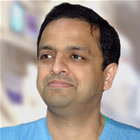
|
What is driving this interest in the transradial approach to coronary interventions -- a procedure where the radial artery in the wrist is used for catheter access instead of the femoral artery in the groin? Dr. Pancholy opined, "Perhaps it's because of our group [of radialists] and our presence, handing out brochures and having meetings. But perhaps more, it's because of the volume of data that's been accumulating about patient comfort and safety, the lower bleeding complications and the increasing concern about hemorrhagic complications of the transfemoral approach, which often cause worse outcomes than, for example, a micro-heart attack that may occur during the procedure." "The Society for Cardiovascular Angiography and Interventions has always been on the leading edge for the interventional community," Pancholy recounted. "Five years ago, SCAI held its first meeting on transradial. It was an hour session in a small conference room. Four of us showed up." In contrast, at this year's annual meeting, being held May 5-8 at the Hilton San Diego Bayfront, two major concurrent sessions on transradial are on the agenda. Both are aimed at an audience of cardiologists who primarily practice the femoral approach (currently 95% of all cases are done from the groin). The first session on Wednesday morning, May 5, is a half-day "Transradial Mini-Course" and is directed primarily at interventional cardiologists and fellows who are already interested in trying the transradial approach. This will be more of a how-to session with instruction on catheter selection, arterial puncture, tips and tricks, etc. -- eight presentations by experienced transradial operators, including Dr. Tejas Patel of India, perhaps the most experienced radialist in the world. The second session, being held on Friday afternoon, is titled, "Arterial Access with Focus on Transradial Approach" and is more of an introductory overview of the benefits and features of performing catheter-based interventions from the wrist. Co-moderator Dr. Tift Mann of Wake Heart Associates in North Carolina invites all interventional cardiologists to attend the session to find out why the technique is so widely used in other countries. He says, "In France, for example, 50% of all interventional procedures are done transradially. In the U.S., I think the latest number I saw was less than 5%.... We're hoping that what people will get out of the session is some degree of enthusiasm for learning this approach and bringing it into their own labs. We'll be talking about the benefits and the reasons why we use it." A complete schedule of the two sessions follows:
More information about the SCAI 2010 33rd Annual Scientific Sessions, as well as online registration, can be found at www.SCAI.org/SCAI2010. About The Radial Access Center on Angioplasty.Org For patients there is also a "Hospital Locator" that lists U.S. centers practicing radial angiography. As Dr. Howard Cohen of Lenox Hill Hospital in New York says of the wrist technique, "Patients really prefer it. 95% of people who've had it both ways would say 'I'm coming back to you, Dr. Cohen because I like this transradial a lot better than the other way!' Reported by Burt Cohen, March 30, 2010 |
||||||||||||||||||||||||||||||||||||||||||||||||||||||||||||||||||||||||||||||||||||||||||||||||||||||||||
